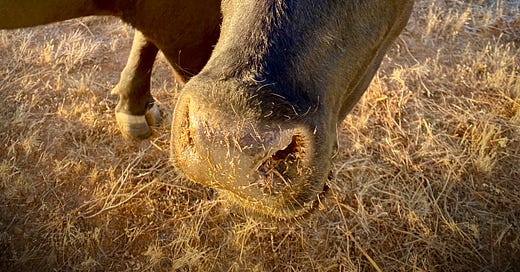Empathy starts with clean water.
Prime Future 007: the weekly newsletter highlighting trends in animal protein
Empathy.
Listening.
Understanding.
Why is it this way?
How did we get here?
What solutions have been tried before? Why didn’t they work?
Who’s incentivized to maintain status quo?
What’s the cost of maintaining status quo?
What should we keep from the status quo?
What’s the benefit of a solution to this problem?
What barriers must be overcome to implement a solution?
Empathy is how innovators wrap their mind around a customer's problems and the considerations for a solution.
Listening to one another is how dissimilar people find common ground.
Understanding one another is how we get to better outcomes.
Think of this process as getting “clean water”. Bringing in unfiltered perspective. Or, as getting your hands dirty, digging into what the problem looks, feels, and sounds like in the day to day experience of living it.
Empathy is the ability to understand someone else’s feelings. The emotions around the use of a product can have a lasting impact on adoption and usage, even in B2B use cases.
Startups die for a lot of reasons, but a leading cause of death is lack of customer empathy. Said differently, a lot of startups die from founders’ unwillingness to listen and have their assumptions challenged or even proven wrong; from the assumption that the founders know better than their would-be customers who live and breathe the problem daily.
Without sufficient understanding of the problem being solved, it's almost impossible to create the right solution.
Successful innovation starts with empathy.
Grab the Prime Future ebook (link)
Like what you’re reading? Get 46 additional editions of Prime Future to date in one PDF. From livestock genetics to new business models, get insight into trends and strategies across animal ag.
Chicken Libor?
It was a big news week in chicken markets:
“Four current and former chicken industry executives…have been indicted for price fixing. A grand jury…indicted all four with one count of conspiring to fix prices for broiler chickens from at least 2012 through 2017. The Department of Justice said in a statement that the criminal investigation into price fixing is still ongoing, and the four men are the first to be charged.”
Even more interesting, this Bloomberg writer on “Chicken Libor”, aka the larger issue with price discovery in chicken:
“The indexes are calculated by, essentially, calling up buyers and sellers of chicken and asking them how much they are paying or receiving for chicken. If you are a chicken producer with a contract to sell chickens at the index price, and someone from the index provider calls you up asking you what the price should be, you have an incentive to quote a high number. If the index price goes up, the price you are paid on your contract will go up. Quoting the high number doesn’t cost you anything—you are just saying a number over the phone to someone who is writing it down—and it makes you money, so you'll be tempted to do it.
This is precisely the mechanism that led, in the financial industry, to the Libor manipulation scandal: Trillions of dollars of loans and interest-rate derivatives were priced off of Libor, the London interbank offered rate, which was calculated by calling up banks and asking them what the price of money was that day.”
Here are some thoughts on opportunities for technology to increase transparency in meat, poultry, and livestock markets.
Listening throughout the value chain
A great read from AgThentic on “Us vs Them” thinking in agriculture, and ways producers can work with consumers instead of against them. On the nose!
Future of Ag podcast episode with a company, P&P Optica, that works with processing plants to address “challenges such as the $4 billion annual loss that takes place in the food processing space around foreign material detection.”
An interview from Ag Startup Engine with the founders of Performance Livestock Analytics on their recent acquisition by Zoetis. I really enjoyed the context about the journey of that business.
The 1619 podcast understanding the experience of some black farmers in securing operating loans.
A podcast interview with Dr. Aaron Gaines about animal health innovation and aligning research priorities with profitability, a focus on swine.
About Janette
Janette Barnard works to enable technologies throughout the animal protein value chain. She leveraged her commercial experience with Elanco Animal Health, Cargill, and McDonald’s Global Supply Chain team to launch and grow two animal protein focused startups. Janette is now a principle in Rock Road Consulting, helping companies to launch, source, and fund innovation




